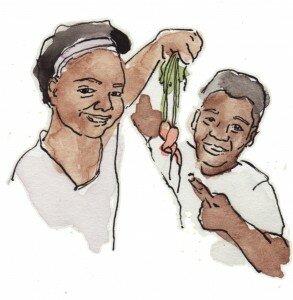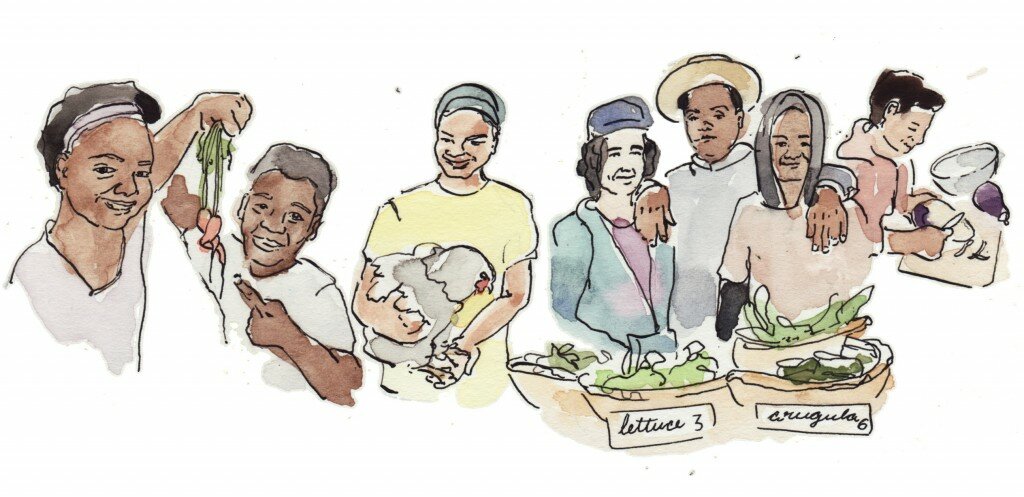2. LEARNING TO FARM
Click on the categories below to navigate quickly to a certain section!
2.1 Move to a New Beat | 2.2 Stories from the Field | 2.3 Getting a Farm Education | 2.4 Learning in the Field |
2.1 Move to a New Beat
Young people can serve our country food!
You can create new relationships between the country and the city and improve access to good food in your community. You can collaborate with all kinds of people: farmers, chefs, families, friends in different towns to launch a CSA or food processing kitchens, make jam, collect honey, age cheese, raise animals, harvest fruit, sow grain, and bake bread. Your farm business can bring money, better food and more jobs to your community. You can be an active member of a growing young farmer community across the country.
Being a farmer is a great career path with many perks! You can work outside everyday, enjoy the outdoor world, improve your land, and eat the freshest foods. Living on the land, producing good food for people who you love and supporting your family all at the same time – what could be better than that?
 Farming requires on-going education, careful planning, personal strength, and patience. Developing your farm business can take time, but there are many steps you can take today to move towards becoming a great farmer
Farming requires on-going education, careful planning, personal strength, and patience. Developing your farm business can take time, but there are many steps you can take today to move towards becoming a great farmer
- Get strong! Start being more active every day: lift weights, stretch, walk.
- Manage your money: Start managing your money save money, pay off debt, set a budget, develop accounting skills and basic business spreadsheets.
- Get schooled: Identify your strengths and weaknesses, attend classes on agriculture-related topics, participate in farmer training and field days, visit farms of all sizes and types, volunteer, do a work study, job shadow a farmer, get advice from farmer mentors.
- Start a business plan: Develop business relationships with your lender, real estate agent, local Chamber of Commerce, and neighborhood farmers.
- Grow your community: Meet other aspiring and beginning farmers through resources suggested here and existing farm networks in your town, improve relationships with landowning friends and family, get involved in community events, develop farmer friendships, get involved in your local 4H, FFA, Grange, Farm Bureau, or County Fair.
- Get working: Do internships and apprenticeships, get a farm job, work at a farmer’s market. Accustom yourself to service, learn to love a hard job well done. Apply yourself fully to the task at hand. Feel good for what you can produce with your applied energy.
Ways to Participate in the Farming Movement Today
Take a Class
You can learn more about what it takes to bring the food you eat from the farm to your table through low cost and free classes are available through your local extension office, non-profit agricultural organizations, schools, and clubs. Look for opportunities to learn more about composting, canning, gardening, small business development, animals, solar energy, and more. You can also check your community pages for calendars of events, and sign up for agricultural topic newsletters and blogs to learn more about what opportunities are available near you.
Support a Farm Near You
Purchasing from local farms can be a great way to learn more about what types of farms, crops, and animals are common in your region, and can be a wonderful method for getting to know farmers in your community. Visit roadside stands, farmers markets, CSA’s, and CO-OPS to sample local products, purchase your groceries, and soak up knowledge.
Share What You Know
Agriculture classes in schools, 4H, FFA, and other youth agricultural clubs are always looking for volunteers. Help mentor youth as they explore agricultural topics, and enjoy the benefits of learning from the youth. Offer to help out with community classes and events where you have the benefit of a little expertise, whether it’s in cooking, composting, or raising rabbits. Sharing what you know with a humble spirit will open your opportunities to learn more from others.
Visit Farmer’s Markets and Support Local Food
Many neighborhoods have farmers markets that provide a marketplace
for locally produced goods. Farmer’s markets are a great place to develop relationships with local farms, ask questions, and get to know what’s going on in the region. Supporting farmers markets puts money directly into the hands of farmers. To show support the farmers in your community, you can submit positive feedback and reviews online and in letters to your local newspaper, and being to pay attention to the new businesses in your town — who they are and what they do.
Start a Garden or Small Scale Farm
Begin your farm journey with a first step into the world of gardening and small-scale farming. Whether it’s a garden on a small patch of community land, an urban roof garden, or window box filled with edible plants, there are many ways to make small scale agriculture productive and satisfying.
If you don’t have access to land, don’t need to feel discouraged. Gardens and mini-farms are popping up in cities all over the world. All you need is a container, some soil, and a seed and you are on your way to growing your own crops. Urban farmers have even embraced keeping city chickens and urban bees. Some farms have gone mobile, and are planted in the back of trucks, while others are vertical and attached to building walls! By getting your hands dirty on any scale, you are learning more about farming, and learning to appreciate the complexities of nurturing growing things into a product you can harvest.
Support a Community Garden
You probably have a local community garden in your area, and if there isn’t – start one! The best way to get used to growing and caring for plants and animals is to learn to do it with community members and friends . In the process of experimenting, you’ll gain a better understanding of how agriculture works and gather ideas for your future farm. A community garden can also be a great place to launch a small farming business.. Use the garden as a platform for bringing people together, growing food and cultivating a community.
Celebrate Local Farmers at the County Fair
Many communities host a county fair each fall. Get involved in the fair by volunteering to set up competition events, visiting the barns, and chatting up the farmers showcasing their hard-won ribbons on fantastic crops and healthy young animals. Submit your own vegetables and animals to the competition and see how you stack up against your neighbors. Engage in some healthy competitive bragging and enthusiastically embrace the joys of the community harvest.
2.2 Stories from the Field
The Ladies of the Phillies Bridge Farm Project
by Ashley Morford
It doesn’t take long to notice that food is the passion at Phillies Bridge Farm Project in Gardiner, New York. Boasting an impressive 65 acres, the farm has been protected through a land trust since 2002. Phillies Bridge Farm Project is more than your average farm: education is an important part of their mission. Amie Baracks, the 2010 Education Director, oversees Farm Camp, school visits, Growing Together, and adult workshops that focus on sustainable agriculture. Phillies Bridge is a not-for-profit organization, and, while the Board of Directors helps with fundraising and fiscal management, while the unique farm operations and rests in the hands of six young dynamic women who know food and want to share their knowledge with anyone keen
on learning.
One of these young women is farm manager Anne Eschenroeder. Anne is not new to farming. Between earning a certificate in Ecological Horticulture from the University of California Santa Cruz and an undergraduate degree in Environmental Studies and Anthropology, she has learned a thing or two about dirt. She manages the farm’s 22o member CSA, delivers to seven different restaurants, and runs the six acres of land that make it all possible. The farm was abuzz when I pulled into the grassy parking lot: farm-camp children were playing with the hose and the smell of zucchini bread was in the air. Education Director Amie Baracks greeted me with a warm smile and said “Let’s eat!” While enjoying the food made by the women, I asked what the most difficult part of being a young farmer was. Each agreed that finding secure land and guidance is hard. Amie said, “It is just hard to know what to do.,” noting that it is really difficult for a young farmer to find a work/life balance. She has farmer friends who work so hard on the farm in July that they end hurting themselves.
 The young women are hopeful about the future for young farmers. They advise young farmers to “just do it” while laughing at the corporate culture they took the motto from. To be a success in farming, they said, young farmers just have to get involved and try things out.
The young women are hopeful about the future for young farmers. They advise young farmers to “just do it” while laughing at the corporate culture they took the motto from. To be a success in farming, they said, young farmers just have to get involved and try things out.
After lunch, each farmer quickly darted off to individual tasks and I join Amie and another young farmer named Mary-Kate for herbal tea and zucchini bread with the kids. The children attending Farm Camp told me the name of the herbs in the tea, yelling “Lemon Balm!” and “Chamomile!” and “FENNEL!” in unison.
After a lovely visit and tasty farm-cook meal, I walked to the car and heard Amie lead the kids in a thank you song: “…Blessings on the fruit, and Blessings for the trees”. Even in a short visit to the teaching farm, I learned a lot about what the motivation, hard work, and excitement of small group of young farmers could do— from educating youth about the earth and food to creating community and space to enjoy and celebrate it together.\
2.3 Getting a Farm Education
If you are serious about farming and discovering whether farming is the career for you, hands on experience is the best teacher. Hands on experience on farms involves low-paid work but has high educational value in which a new farmer learns from an experienced farmer. Be prepared to work very hard at all phases of your farm career, but particularly in the beginning. There is a lot of hard work and a hierarchy of skilled tasks in farming, and you’ll have to test yourself by doing the lower-rung duties before you move on to higher level tasks. You’ll get to be outside most of the time and even repetitive farm tasks (like weeding and shoveling manure) can be peaceful and interesting, giving you time to dream about your own farm.
Job-Shadow
A job shadow is a short term opportunity to follow a farmer around through their daily tasks and observe their day to day occupations. This generally does not involve a great deal of handson work and is a good first step in exploring a farm career.
There are many ways to gain a farm education and experience; here are some of the most common:
Apprenticeship
A farm job where you are unpaid or paid a low rate is typical because you are usually housed and fed wonderful fresh food, and are learning on the job. A good apprenticeship opportunity will explain up-front how much of your time will be spent learning versus actively working. Farmers act as mentors, and teach about why each task is important, when it should be done, and go into detail about the finer aspects of the farm as a business.
 Internships & Work-Study Experiences
Internships & Work-Study Experiences
These are similar to apprenticeships, but considered a bit higher level. They are often unpaid or require the participant to pay a fee in exchange for the privilege of working/learning. Each day should have a very high level of learning, and you might be able to arrange school credit in exchange for the experience.
International Apprenticeships
World-Wide Opportunities on Organic Farms (WWOOF) offers a way to travel world-wide and get hands-on farming experience by working and staying on organic farms, You can WWOOF anywhere in the world, work for free, eat for free, stay for free, meet fantastic organic farmers, and help them with their operations. Harvesting olives in Italy sounds glamorous – and it is – just remember that hard physical work for 6+ hours a day in the sunshine takes a bit of getting used to, no matter how scenic the views. http://www.wwoof.org/
Farm Jobs
There are jobs on farms offered at a standard wage. Farm jobs usually require some experience, and do not offer the level of personal mentorship and philosophical discussion of the why’s and how-to’s of farming.
Specialty Internships
From dairy/cheese making to herbal medicine, bio-dynamics to greenhouse production, and holistic management and intensive grazing–if you look for it, you’ll find it. Many times the best way to find out about these opportunities is through growers associations, sustainable agriculture certification bodies, and specialty farming groups. Take a look at the RESOURCES at the end of the book.
Mentorships
Finding an individual trusted mentor is an important step for any young farmers. An experienced farmer who lives close by will be able to easily answer climate, equipment, pest and liability questions that arise. The advice of a trusted agricultural friend is incredibly important. Older farmers are usually glad to pass on their wisdom and are mostly quite generous once they establish that you are worthy of their time.
University-Based Programs
Many universities across the U.S and Canada offer agricultural programs and can be great ways to integrate a love of people, place, science and the environment.
Farm Schools, Farm Incubators, & Certificate Programs
There are programs you can join where you will be taught to farm by experienced teachers. Agricultural education programs offer skills assessments and provide training to support individuals as they develop farming skills and plans. The programs usually involve a set curriculum of standard classes, and requires regular attendance. Agricultural education programs exist in most high schools and state colleges. Programs are also offered through Cooperative Extension, non-profit beginning farmer service providers, Farm Bureau, and community small business incubators. Several farming programs are also available that offer fully paid or low cost educational opportunities; applicants are selected on a competitive basis. Farm programs may offer business incubators to encourage small farm business development on site. See the appendix for examples of several programs offered in the Northeastern United States.
Life Long Learning
Education is a life-long process. You can move from a farm dreamer to a farm owner, a beginner to an expert, a youth to a wise sage. One of the greatest rewards a farm life offers is the freedom to wake each day and shape the future of your little plot of land. With your careful stewardship and guidance, the dream you now have of a farming career can grow into a successful, family-supporting, community-building, life-sustaining business for a succession of future farmers to enjoy. The agriculture community welcomes you into our life long process of learning together to feed the world.
2.4 Learning in the Field
The first step is figuring out what you want to do. What do you want to farm? Are you an animal person, a vegetable person, a flower or herb person? Do you like interacting with the people who buy the food? Are you interested inner-city nutrition or high cuisine? Do you like food-processing/value-added products? Do you have the desire for dairy? The strength for fieldwork? The patience for the bureaucracies of commercial kitchens? The personality for farmers markets? There is also the option of starting other agricultural businesses.
One big key to being an on-farm learner is to understand the task at hand. Try not to ask too many questions of the farmer all at once, but observe carefully and thoughtfully. You’ll be surprised what you can discern when you open your eyes wide and pay attention to what is happening. Learn the details of the system as you work—as you do daily chores, make a silent inventory what you would do to make work flow smoother, or imagine reasons why the farmer you work for came up with this particular system. Check with the farmer to get their feedback and think about how you would apply what you’ve learned to your own operation.
The experienced farmer will value an observant person and reward a good question with insight into his/her farm operation. Watch what your teacher is doing, how they are moving, where they are spending time, and what they are pausing to observe. Work smart, keep a journal, and read every book you can find on your chosen field. Don’t be quick to judge, sometimes the oddest steps turn out to be the most profitable aspects of a farm’s success, and the oldest, most traditional techniques the most tested.
In finding a fulfilling apprenticeship, be sure to:
- Consider the type of agriculture you wish to experience. Big or small-scale? conventional, organic, biodynamic, permaculture, semi-urban? Solely fruit, vegetables, grain, or animals, or a combo?
- Visit a potential host farm. Talk to the farmers, workers, past interns, and look at the fields and the infrastructure. Get a feel for the dynamics and the routine if one exists.
- Look at amount and type of labor required and other expectations. How long are typical work days? What peak times will you be expected to contribute more? Clarify start and end dates, weekend responsibilities, and what would happen in case of illness/injury that would prevent normal work tasks.
- Look for a well-rounded position. Get exposure to a range of management skills.
- Be clear on compensation. You and the farmer should understand all terms of the agreement before any employment. Is there a fee or a stipend? Housing or food included? How many hours of work are expected each week? There are tons of resources and organizations online and in your state that can help match you up with the right apprenticeship. Spend some time looking through the RESOURCES at the end of the Field Journal.
Comments
Leave a Reply
Your email address will not be published. Required fields are marked *





